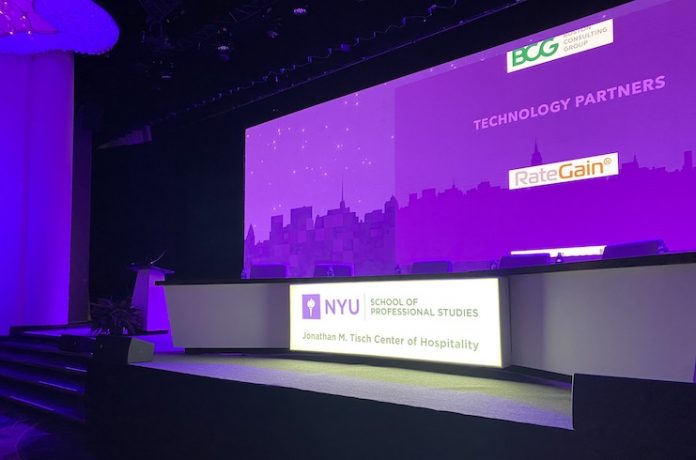
Over the past 18 months, guests’ expectations, wants, and needs have constantly shifted throughout the COVID-19 pandemic. While hoteliers were able to predict expectations over the course of the pandemic, those predictions were sometimes inaccurate. Now, as the hospitality industry enters a recovery period—especially as the United States lowers its international travel restrictions—guests’ expectations have been and will continue to shift.
On the third day of the 2021 NYU International Hospitality Industry Investment Conference at the New York Marriott Marquis in New York City, in a conversation titled, “Industry Leaders Discuss Current Trends Shaping the Future of Travel and How to Capitalize on What’s Coming Next,” Eileen A. Crowley, vice chair—U.S. travel, hospitality, and services co-leader for Deloitte & Touche, led panelists in a discussion that included how hoteliers can meet guests’ needs.
The panelists agreed that since the beginning of the pandemic, guests’ expectations have rapidly changed, but how those changes impact specific companies and brands varies. Carlos R. Flores, president and CEO, Sonesta International Hotels Corporation, said that early in the pandemic, there was a mutual understanding of what Sonesta’s guests wanted. But, Flores said, “As the pandemic wore on, we saw a bit of a different change, some in clientele. But now in this stage, we’ve seen a very different shift. The expectations associated with what they expect when they show up on property is radically different than what it was just six months ago.”
Sonesta—like most hotel companies—intentionally provided guests with a variety of modified amenities and operations that met guests’ needs throughout the pandemic, like limiting housekeeping. Now, however, Flores said, the “same comfort that was either appreciated or understood whereas now it’s become a point of friction.” Some guests that want amenities like housekeeping become frustrated when the service isn’t automatically provided, which Flores notes is “radically different” than what Sonesta had seen prior.
Both Flores and Jim Alderman, CEO, Radisson Hotel Group, Americas, agreed that guest expectations have come back quicker than the hotel industry previously thought. While Alderman said Radisson is meeting the higher levels of ADR seen across the United States, they’re seeing the same frustrations as Sonesta when guests expect more than what the property is offering. Alderman says that hoteliers meet “ADR, but you haven’t brought everything back; in most cases, it’s because you can’t.” Alderman also reflected that frontline hotel workers are the ones that handle frustrated guests, saying, “My team and our colleagues in the field and our owners must be the most daring people alive.”
Alderman implied that those expectations stem from the monetary value guests put on their hotel stays; Sloan Dean, CEO and president, Remington Hotels, added, “You have to consider they’re pent up in their house and now coming to a hotel, they want to have not only the same experience but an exceptional experience.” Dean thinks modified operations will stick throughout COVID-19 recovery because customers are accustomed to using technology implemented for modified operations, but guests want those combined with operations available pre-pandemic.
Jeff Wagoner, president and CEO, Outrigger Hospitality Group, mentioned the resort space is different than the transient hotel space. Wagoner said Outrigger planned on budgeting for 70 percent of housekeeping when planning for 2021, but the company found before the year began that there was a 90 percent demand for housekeeping. Outrigger found its guests didn’t want modified housekeeping, adding, “We saw the surveys, we heard the chatter about what was going to happen. It didn’t really materialize. The consumer didn’t want it. The consumer came back and said, ‘I really want those services in a resort environment. I paid a lot of money. I’m going to a resort, I’m here on vacation, I’d like to have my room taken care of.’ We never really did see a significant drop in housekeeping.”
For Margaritaville, which has a similar demand to Outrigger, John Cohlan, CEO, Margaritaville, found that guest expectations should be viewed through the lens of the brand rather than industry-wide. Cohlan said Margaritaville visitors typically look for “a fun, escapist experience,” so the company can get creative meeting their expectations. He added, “We drove into the areas of expectation that are somewhat not as limited by some of these strong forces. We found that to be, I think, that fact made it better because those things stay and essentially allow you to play to your strengths.”
Factors that impact evolving domestic guests’ expectations include the labor shortage, travel restrictions, and COVID comfortability. But as U.S. hotels begin welcoming international travelers back, hoteliers need to also consider the expectations of guests staying for longer periods. To do so, hoteliers should review length of stay, brand differentiation, and traveler preferences to meet guests’ expectations as they return to travel.











